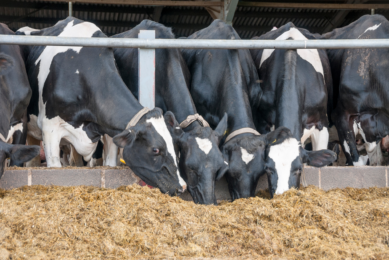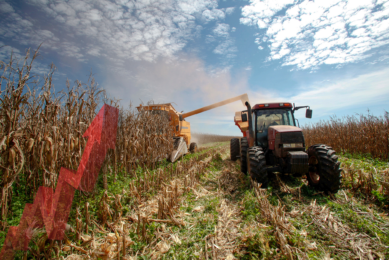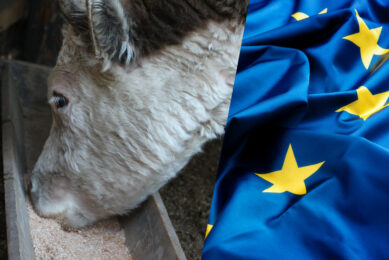HaBeMa, global turntable for feedstuffs and grains
In a relatively short period of existence HaBeMa Futtermittel has become one of the leading animal feed companies in the German market. Located at the port of Hamburg, HaBeMa turned into a nationwide commercial partner for feedstuffs, compound feed and grains.
HaBeMa Futtermittel, founded in 1994, is a service company since it manufactures complete feed and distributes the feed and raw materials for its two shareholders, namely HaGe Nord based in Kiel, Germany, and ForFarmers in Lochem, the Netherlands. Each holds a 50% share since October 2009 when they took over the remaining 15% share of Agravis Raiffeisen (based in Münster, Germany), which is still owned by HaBeMa.
The main business of HaBeMa is composed of three sections, being compound feed production, raw material turnover, and logistics.
Compound feed
At the modern compound feed plant, high-quality feed for all animals in the agricultural sector is produced for the shareholders of HaBeMa. Although some buildings are already 40 years old the application of modern techniques meets the requirements for quality and security in animal feeds. With 400,000 t feed production peaked in 2008, and in 2009, around 350,000 t was produced on three production lines. One line is fully dedicated to manufacturing ruminant feeds, which is a heritage of the BSE crisis when these feeds had to be produced separately from pig and poultry feed, in order to avoid any contamination with animal proteins. “Now we produce only 100% vegetable feeds, so it is not so relevant anymore,” says Christian Schorling, nutritionist at HaBeMa.
The feed is manufactured on nine pelleting mills. Ruminant feeds require 50% of capacity, pig feed 30% and poultry feed 20%. Since the poultry meat sector in Germany is strongly integrated, and HaBeMa is an independent mill, it mainly makes feed for the hardly integrated laying hen market. Apart from the production of the classic standards, production on three parallel mixing lines also affords the manufacturing of made-to-order solutions for individual feed concepts. All feed is manufactured on a just-in-time basis. To facilitate this principle the raw materials are dosed from 76 dosing bins, and complete feed is stored in 74 loading bins. Around 7% of feed is bagged, but this depends on the season. “This begins with quality in purchase of contractually stated qualities of a well-known origin. We have complete control of raw materials with regard to their nutritional values as well as cleanness,” says Schorling.
One aid to support this goal was the implementation of an automatic sampling system for raw materials. Samples are coded and stored for six months, guaranteeing maximum traceability.
Transhipment of bulk goods
An important pillar of the HaBeMa enterprise is transhipment and bulk service of raw materials. Alongside the mill is a 320 m long quay where the water depth is 12 m. This facilitates the anchoring of ships up to Panamax size. To unload these ships a gantry crane can move 500 t per hr, and a derrick crane can shift 150 tph. This results in an unloading capacity of 10,000 t per day. For loading, a ship loader with 700 tph capacity is used resulting in a 15,000 t per day loading capacity. With these transfer facility HaBeMa is a partner for the agricultural trade in northern Germany for the acquisition of compound feed and individual feed on the one hand, and on the other hand for the marketing of domestic grain. The partners of HaBeMa’s agrarian trade level collect the domestic grain of the agricultural business and is bundled into big export units at the plant site, then stored and distributed in all directions. Storage facilities include 12 steel silos of 7,500 t each, and indoor storage rooms adding up to 200,000 t in total.
Logistics
Raw materials are used either for proper compound feed production or loaded after interim storage in large halls and silos on ship, rail or truck. Recently a new train unloading terminal was established. Rail transport is important in northeast Europe. Each train consists of 26 wagons with a holding capacity of 25 t each.
HaBeMa holds its own fleet of 20 trucks for supplying compound feed to farmers. Annually these trucks drive 2.8 mln km, which is almost 70 times around the world. The truck fleet supplies around 70% of all feed sold, and takes care of 30% return cargo, mainly grains. For the sake of the environment all trucks run on biodiesel.
With all these feed production and transhipment of goods, a lot of machinery needs to be maintained. HaBeMa employs four mechanics and five electricians. In total some 45 people (15 in feed mill, 15 in shipment, 15 in office) and some temporary workers run the whole business. A total of 38 drivers are employed for the truck fleet who work in shifts, and who also do night deliveries. “We try to use the trucks as efficiently as possible. Farmers are therefore encouraged to receive night deliveries by giving them a discount on the feed price,” Schorling said.











